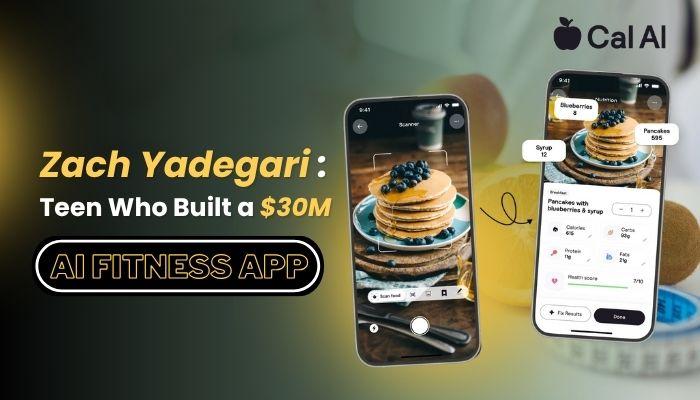College is a time when most 18-year-olds are thinking about studying, having fun, or working part-time jobs. But Zach Yadegari was quietly creating something that would revolutionize the fitness industry forever. At 18 years old, Zach founded Cal AI – a groundbreaking AI-powered fitness app with an artificial intelligence component and in less than 8 months, he had scaled it to be worth $30 million.
The story is not just about tech, fitness, or a viral app. It is a matter of vision, timing, and an impervious belief that innovation can come from anyone, even a teenager’s study room.
The Problem: A Broken Fitness Experience
Zach’s story starts like many others: frustrated with fitness apps that were too monotonous, impersonal, and ultimately ineffective. Whether it was endless generic workout videos, or following a strict training plan, nothing quite felt like the system adjusted to his availability and energy level.
“I kept thinking, ‘Why is this app treating me like everyone else?’ I was sore one day, strong the next, and bored by week two,” Zach recalls. “I wanted a fitness experience that was as smart and adaptive as my phone.”
The existing options for platforms were a one-size-fits-all model predicated on scale, pre-recorded classes, or algorithmic suggestions about what to do in a workout. But none felt truly intelligent. That is when Zach had his lightbulb moment: What if AI could provide you with the same fitness experience that adjusts to your needs in real time, just like an actual personal trainer?
Also Read: Cera Care: AI-Powered Compassion in Home Healthcare
The Idea: Building Cal AI
Zach decided to do exactly that and started concepting what would eventually become Cal AI — short for “Calisthenics Artificial Intelligence.” Simplicity, but simplicity with ambition; a new AI-powered fitness coach that learns from your movements and progresses over time while attending to – listening to – what you want out of it.
He started developing the app solo, learning how to incorporate AI, computer vision, and real-time analytics on his own. He spent all-nighters studying pose estimation models, refining workout algorithms, and creating a sleek, user-friendly design that would resonate with Gen Z and fitness newcomers alike.
What made Cal AI stand out was the real-time feedback loop. With your phone’s camera, the app would be able to monitor form and correct posture as well as modulate intensity according to performance, much in the way a personal trainer does. And it did all these things without the high price or intimidation of an actual gym or coach.
Bootstrapping the MVP
Zach launched a minimal viable product (MVP) within three months. It was not immaculate, the UI was rough, and the models were not fully optimized — but it worked. He started beta testing it with friends, fitness influencers, and small online communities.
What followed was an outpouring of immediate feedback:
“This is insane.”
“Better than my $80/hour trainer.”
“The app just gets me.”
With validation in the bag, Zach doubled down — he doubled down and refining on his AI experience by continuing to improve user interface design (UX) with a strong eye towards wider beta release.
Going Viral: Cal AI Takes Off
What happened next was not part of any business plan. A TikTok video showing how Cal AI would provide real-time feedback went viral. The app was already being downloaded by thousands of people within 48 hours. Influencers started DMing Zach. Tech bloggers wanted interviews. And most importantly — users kept coming back.
“I didn’t think it was going to take off this quickly,” Zach says. “I did not want to make just a little thing, but something that was useful. But when they saw it in action, people wanted to have that.”
Zach leaned into the momentum. He rolled out new features every week, introduced community challenges, and called early users regularly to optimize the functionality. Growth snowballed. Within the first few months, Cal AI sustained 50k+ active users, with a 72% retention rate — unheard of in the fitness app space.
Raising Capital and Scaling Up
As the numbers skyrocketed, investors took notice. Angels and venture capital firms inquired about their company, with competing content companies approaching them too. Many were surprised to find out the founder was just 18 years old.
“Age didn’t matter,” Zach says. “They were interested in the product, the traction and our vision.”
Zach raised a $2 million seed round just 5 months post-launch, spending the funds on scaling infrastructure and importing engineers to scale down AI R&D. By the eighth month, Cal AI had reached a valuation of $30 million.
The Mission Behind the App
Beyond the headlines and funding rounds, Zach remains grounded in his mission: to make smart fitness accessible, engaging, and personalized for everyone.
“Today’s fitness solutions are generally not designed for the user. They are made for mass content dissemination,” Zach explains. “Cal AI is about you. Your body. Your goals. Your pace.”
He envisions Cal AI as more than an app — it is a platform for lifelong fitness, driven by adaptive technology and community encouragement. With nutrition tracking, wearable, and AI habit coaching in the plans, the future is even brighter for Cal AI as it prepares to conduct integration.
Also Read: Transform Your Life with Simple Daily Meditation Techniques
What’s Next for Zach Yadegari and Cal AI?
Zach is now leading a growing team working on the next evolution of Cal AI. Some of the upcoming features include:
- AI-driven recovery plans based on muscle strain and sleep data
- Voice-based feedback during workouts
- Virtual group training led by synthetic AI coaches
- Partnerships with universities and athletic programs
He is also in talks with global health brands and insurance providers to bring Cal AI into broader wellness ecosystems — making it more than just an app, but a core part of modern preventive healthcare.
Final Thoughts: The Power of Bold Ideas
Zach Yadegari’s story is not just about age or tech. It is about spotting what has broken in the world and having the courage — and grit — to fix it. At 18, he did not wait for permission, funding, or a degree. He just started building.
“I didn’t build Cal AI to make noise,” Zach says. “I built it because I believed people deserved better — and I knew AI could deliver it.”
Today, Cal AI is on track to become a leader in personalized health tech. And Zach Yadegari? He is just getting started.




